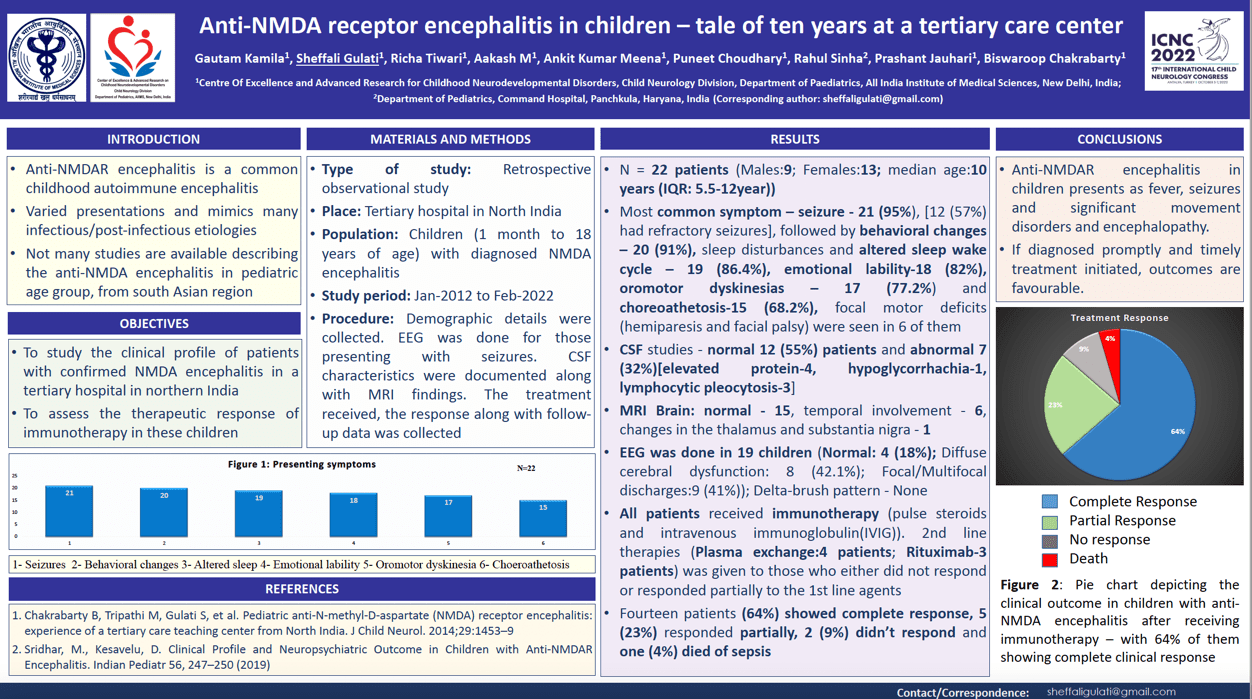Anti-NMDA receptor encephalitis in children – tale of ten years at a tertiary care center
Gautam Kamila, Richa Tiwari, Sheffali Gulati, Ankit Kumar Meena, Puneet Choudhary, Rahul Sinha, Prashant Jauhari, Biswaroop Chakrabarty
Objective: Anti-NMDAR encephalitis is a common childhood autoimmune encephalitis and has varied presentations and mimics many infectious/post-infectious etiologies. We have retrospectively studied the clinical profile of patients with confirmed NMDA encephalitis.
Methods: Clinical data of patients from January-2012 to February-2022, were collected and analyzed. Diagnosis was based on the presence of anti-NMDA receptor antibodies in cerebrospinal fluid(CSF) and/or serum. Results: Total 22 patients were identified(Males:9; Females:13; median age:10 years (IQR: 5.5-12year)). Most common symptom was seizure-21(95%) children, of whom-12(57%) had refractory seizures, followed by behavioral changes-20(91%), sleep disturbances and altered sleep wake cycle-19(86.4%), emotional lability-18(82%), oromotor dyskinesias-17(77.2%) and choreoathetosis-15(68.2%). Focal motor deficits(hemiparesis and facial palsy) were seen in 6 of them. CSF studies was normal in 12(55%) patients and abnormal in 7(32%)[elevated protein-4, hypoglycorrhachia-1, lymphocytic pleocytosis-3]. MRI Brain was normal in 15 children, 6 had temporal involvement, 1 had changes in the thalamus and substantia nigra. EEG was done in 19 children (Normal:4(18%); Diffuse cerebral dysfuction:8(42.1%); Focal/Multifocal discharges:9(41%)). None of them had delta-brush pattern on EEG, as well as tumor screen was negative on imaging studies. All patients received immunotherapy(pulse steroids and intravenous immunoglobulin(IVIG)). 2nd line therapies(Plasma exchange:4 patients; Rituximab-3 patients) was given to those who either did not respond or responded partially to the 1st line agents. Fourteen patients(74%) showed complete response, 5(23%) responded partially, 2(10%) didn’t respond and one(5%) died of sepsis. Conclusion: Anti-NMDAR encephalitis in children presents as fever, seizures and significant movement disorders and encephalopathy. If diagnosed promptly and timely treatment initiated, outcomes are favorable.
Keywords: Encephalitis, NMDA, Immunotherapy
Gautam Kamila
All India Institute of Medical Sciences, New Delhi
India
Richa Tiwari
All India Institute of Medical Sciences, New Delhi
India
Sheffali Gulati
All India Institute of Medical Sciences, New Delhi
India
Ankit Kumar Meena
All India Institute of Medical Sciences, New Delhi
India
Puneet Choudhary
All India Institute of Medical Sciences, New Delhi
India
Rahul Sinha
Command Hospital, Chandi Mandir
India
Prashant Jauhari
All India Institute of Medical Sciences, New Delhi
India
Biswaroop Chakrabarty
All India Institute of Medical Sciences, New Delhi
India
Objective: Anti-NMDAR encephalitis is a common childhood autoimmune encephalitis and has varied presentations and mimics many infectious/post-infectious etiologies. We have retrospectively studied the clinical profile of patients with confirmed NMDA encephalitis.
Methods: Clinical data of patients from January-2012 to February-2022, were collected and analyzed. Diagnosis was based on the presence of anti-NMDA receptor antibodies in cerebrospinal fluid(CSF) and/or serum. Results: Total 22 patients were identified(Males:9; Females:13; median age:10 years (IQR: 5.5-12year)). Most common symptom was seizure-21(95%) children, of whom-12(57%) had refractory seizures, followed by behavioral changes-20(91%), sleep disturbances and altered sleep wake cycle-19(86.4%), emotional lability-18(82%), oromotor dyskinesias-17(77.2%) and choreoathetosis-15(68.2%). Focal motor deficits(hemiparesis and facial palsy) were seen in 6 of them. CSF studies was normal in 12(55%) patients and abnormal in 7(32%)[elevated protein-4, hypoglycorrhachia-1, lymphocytic pleocytosis-3]. MRI Brain was normal in 15 children, 6 had temporal involvement, 1 had changes in the thalamus and substantia nigra. EEG was done in 19 children (Normal:4(18%); Diffuse cerebral dysfuction:8(42.1%); Focal/Multifocal discharges:9(41%)). None of them had delta-brush pattern on EEG, as well as tumor screen was negative on imaging studies. All patients received immunotherapy(pulse steroids and intravenous immunoglobulin(IVIG)). 2nd line therapies(Plasma exchange:4 patients; Rituximab-3 patients) was given to those who either did not respond or responded partially to the 1st line agents. Fourteen patients(74%) showed complete response, 5(23%) responded partially, 2(10%) didn’t respond and one(5%) died of sepsis. Conclusion: Anti-NMDAR encephalitis in children presents as fever, seizures and significant movement disorders and encephalopathy. If diagnosed promptly and timely treatment initiated, outcomes are favorable.
Keywords: Encephalitis, NMDA, Immunotherapy
Gautam Kamila
All India Institute of Medical Sciences, New Delhi
India
Richa Tiwari
All India Institute of Medical Sciences, New Delhi
India
Sheffali Gulati
All India Institute of Medical Sciences, New Delhi
India
Ankit Kumar Meena
All India Institute of Medical Sciences, New Delhi
India
Puneet Choudhary
All India Institute of Medical Sciences, New Delhi
India
Rahul Sinha
Command Hospital, Chandi Mandir
India
Prashant Jauhari
All India Institute of Medical Sciences, New Delhi
India
Biswaroop Chakrabarty
All India Institute of Medical Sciences, New Delhi
India

Gautam Kamila
All India Institute of Medical Sciences, New Delhi India
All India Institute of Medical Sciences, New Delhi India